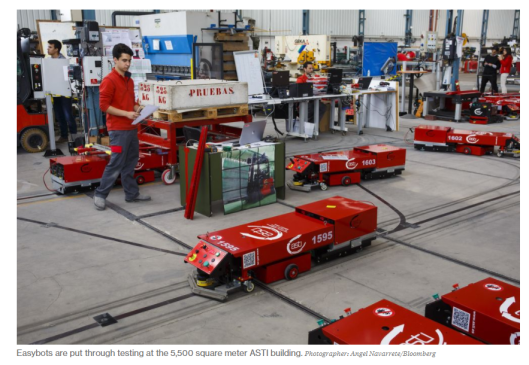In my previous post, we discussed Fully Autonomous Electric Feeder Ships. Fully autonomous forklifts are even less sexy, but they have a potential to be far more disruptive.

Veronica Pascual, the founder of Asti, builds AGVs, or automated guided vehicles such as fork-lifts, stackers and pallet trucks.
Bank of America Merrill Lynch expects robots to be performing 45 percent of all manufacturing tasks by 2025, compared to 10 percent in 2015.
Bloomberg reports Forget Cars, for One Spaniard the Autonomous Future Is Forklifts.
Founded by Pascual’s parents in 1982, the company [Asti] is housed in a 5,500 square meter building at the end of a shabby road. About 150 employees clad in red jackets and black t-shirts build automated vehicles with names like RoboFasts, Easybots and Hardbots. On one side of the factory, engineers and other employees hunch over tables working with the patented technology that allows the vehicles to rely on sensors and lasers to guide their movements.
Much of the space is given up to testing, some vehicles moving freely while others trundle down pre-designed corridors. One project is focused on automated battery changing modules, where vehicles can have their low-charge batteries replaced automatically, without human intervention.
One business model Pascual hopes to change is the traditional factory line, swapping fixed robots for moving ones. “Rather than taking parts to assembly lines, as has been always done, with automated vehicles you have the chance to move parts around, so a car-maker doesn’t have to be tied to the assembly lines anymore,” Pascual says.
Asti sells more than 60 percent of its vehicles abroad, with France as its main market. In 2015, installs of industrial robots surged in Spain by 63 percent, according to the most recent data compiled by the International Federation of Robotics. There is also room to grow. In the same year, there were 150 robots per 10,000 employees in Spain’s manufacturing industry while France had about 127 per 10,000, compared to 301 in Germany.












Leave A Comment